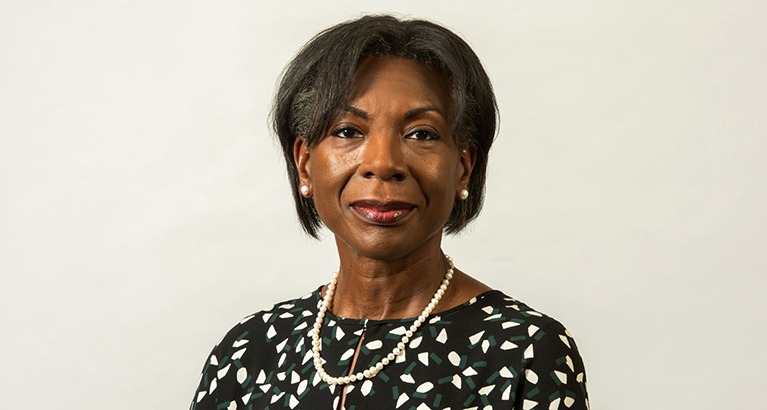The keys to leadership include encouraging diverse views and remaining true to core values, says Wendy Williams in an interview filmed during Black History Month. Wendy, a member of Cambridge Judge Business School’s Advisory Board, is HM Inspector of Constabulary and of Fire & Rescue Services.

“If everyone feels that there is an atmosphere of trust in their organisation and that they can speak up, then you do get a diverse range of views, and that’s where the magic really happens because you can create, you can innovate and you can improve,” Wendy Williams says.
The report headed by Wendy Williams, the ‘Independent Windrush Lessons Learned Review into the Home Office’, was presented to the UK Parliament in 2020. It made 30 recommendations to correct issues that led to the Windrush scandal in which people were wrongly threatened with deportation, detained, and denied legal rights by the UK Home Office, often due to lack of documentation through no fault of the victims. The ship Empire Windrush brought some of the first West Indian migrants to the UK 75 years ago, in 1948.
Wendy Williams’ parents came to the UK from Guyana in South America in the 1960s as part of the 1948-1973 Windrush cohort, “answering an invitation from the British government to help rebuild postwar Britain”. She was born in the UK and became a solicitor in private practice and then joined the Crown Prosecution Service.
Changing the corporate culture by going back to first principles
Three key themes of the Windrush report’s recommendations were: the UK Home Office should recognise its responsibility and apologise for a profound institutional failure and serious social injustice; the Home Office should open itself up to wider external scrutiny; and that the department should change its culture to a humanity-based rather than political approach.
Following her Windrush report, says Wendy Williams, the UK Home Office has taken action to implement many of its recommendations, as recognised in a 2022 progress report.
They set about changing the culture by instituting a people and change programme. It was called One Home Office and it actually involved stripping things right back to first principles: So what's our mission? What's our purpose? What are we here to do? We're here to serve the public, to protect them and keep them safe whoever they are and whichever background they come from.
“And so they build on the mission and the purpose, and then developed a vision. And that’s involved senior leaders being very clear about their vision, their expectations, and the expectations that they would hold to full account their direct reports and their direct reports. So, the Home Office did approach matters fundamentally, and I was pleased to see that.”
The importance of remaining true to your values
In today’s environment, especially as social media “introduces a whole new layer of accountability, but also (in relation to the) immediacy of expectation,” says Wendy Williams, “I think that if people can remain true to themselves, if their values system is uncompromised and if they are uncompromising in securing that, then hopefully they will be able to have the resilience to be able to withstand the onslaught of the various challenges that they may face.”
Wendy Williams was interviewed by Professor Dame Sandra Dawson, a former Dean and current Fellow and Advisory Board member at Cambridge Judge, who commented that there is a fine balancing act for leaders in “keeping the door open and keeping the funnel open and at the same time being clear on what you’re doing and how you’re going to go forward.”
Social media is both immensely open and very polarised, so leaders need to be able to “extract the gems” and “screen out a lot of the noise” to prevent being derailed, Dame Sandra said.
The danger to leaders of ignoring red flags
“I think it does come back to how it is that leaders communicate with their own organisations,” said Wendy Williams, citing the lessons from the Windrush scandal in which civil servants who raised red flags about problems were ignored by more senior officials and politicians.
“They had some excellent ideas. They identified the risks, and yet those risks weren’t appreciated, they weren’t flagged. And that tracked through right to the very top of the organisation.”
Drawing on her career in both the public and private sectors, Wendy Williams said the key to leadership is to identify the purpose and the way to achieve that purpose by bringing everyone on board. “Be very clear about what you’re there to do, who are you there to serve, how are you going to serve them and what can you offer in order to improve the situation for customers or victims or the wider public.”
Why personal connections are so key
The interview also discussed the impact of the COVID-19 pandemic on the workplace including the rise of remote working and isolation that, coupled with social media algorithms, risks confirming rather than broadening our views. As Wendy told Dame Sandra:
We have to be vigilant. For the future, not losing sight of that important personal connection – and it can be via screen, it can be in person – but if anything, it amplifies the importance of effective communication and keeping on talking and being open to ideas, never compromising and never taking what might be the path of least resistance.
The full version of the 276-page Windrush Lessons Learned Review is available online.
An oral statement to Parliament was issued by the then-Home Secretary, Priti Patel MP, who said: “Let me assure this House that everyone at the Home Office will be asking the difficult questions needed to ensure that these circumstances can never arise again.”
A series of online interviews with business leaders
The webinar with Wendy Williams during Black History Month was part of a video series organised by the Alumni & External Engagement department of Cambridge Judge, entitled CJBS Perspectives: Leadership in Unprecedented Times. The series was launched in the early days of the pandemic, in April 2020, to provide a platform for prominent business leaders to discuss issues related to leadership in challenging situations. CJBS Perspectives is now in its third series.
Previous guests have included Eben Upton, co-founder of the Raspberry Pi mini-computer and an Executive MBA graduate of Cambridge Judge; Hedwige Nuyens, Managing Director of the International Banking Federation and Chair of European Women on Boards; Bina Mehta, Chair of KPMG UK; Professor Muhammad Yunus, who won a Nobel Prize for pioneering microcredit in Bangladesh; Lord Browne, former CEO of BP; and Lord Karan Bilimoria, founder of Cobra beer and former chair of the Advisory Board of Cambridge Judge.
Related content
CJBS Perspectives: Leadership in Unprecedented Times
Wendy was interviewed for the ‘CJBS Perspectives: Leadership in Unprecedented Times’ series.
Featured speaker
Wendy Williams CBE
Member of the Advisory Board, Cambridge Judge Business School
HM Inspector of Constabulary
HM Inspector of Fire & Rescue Services





